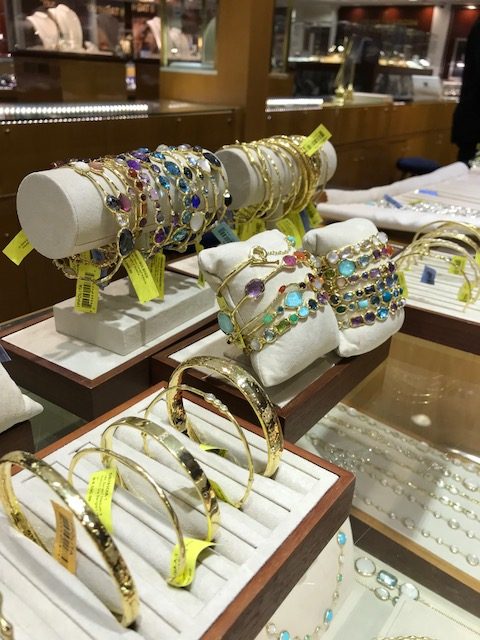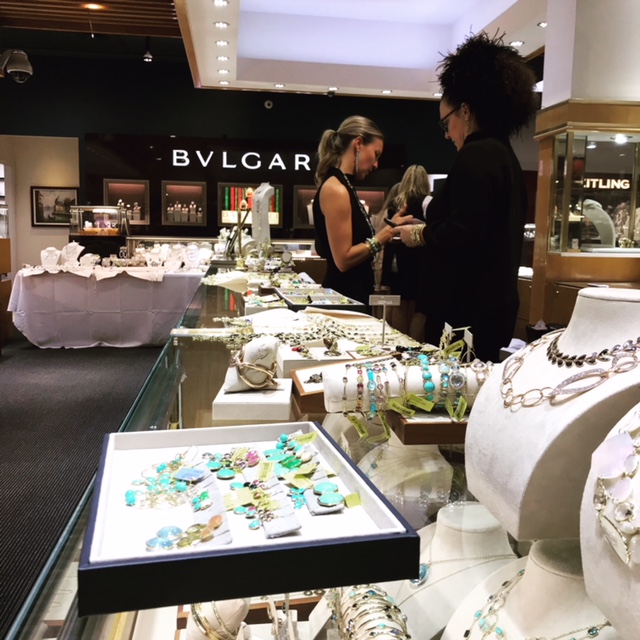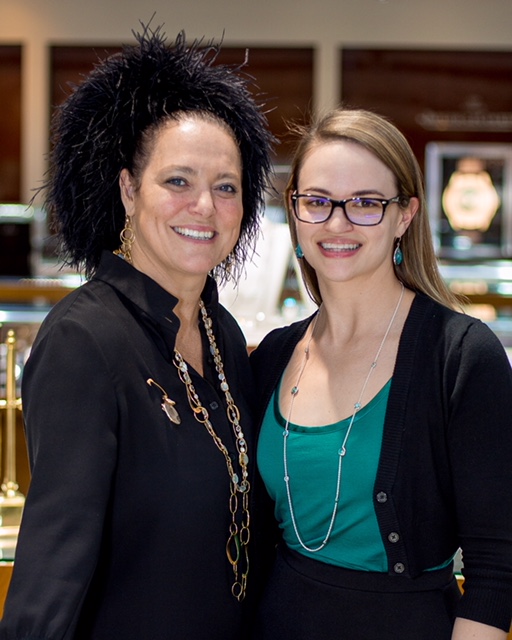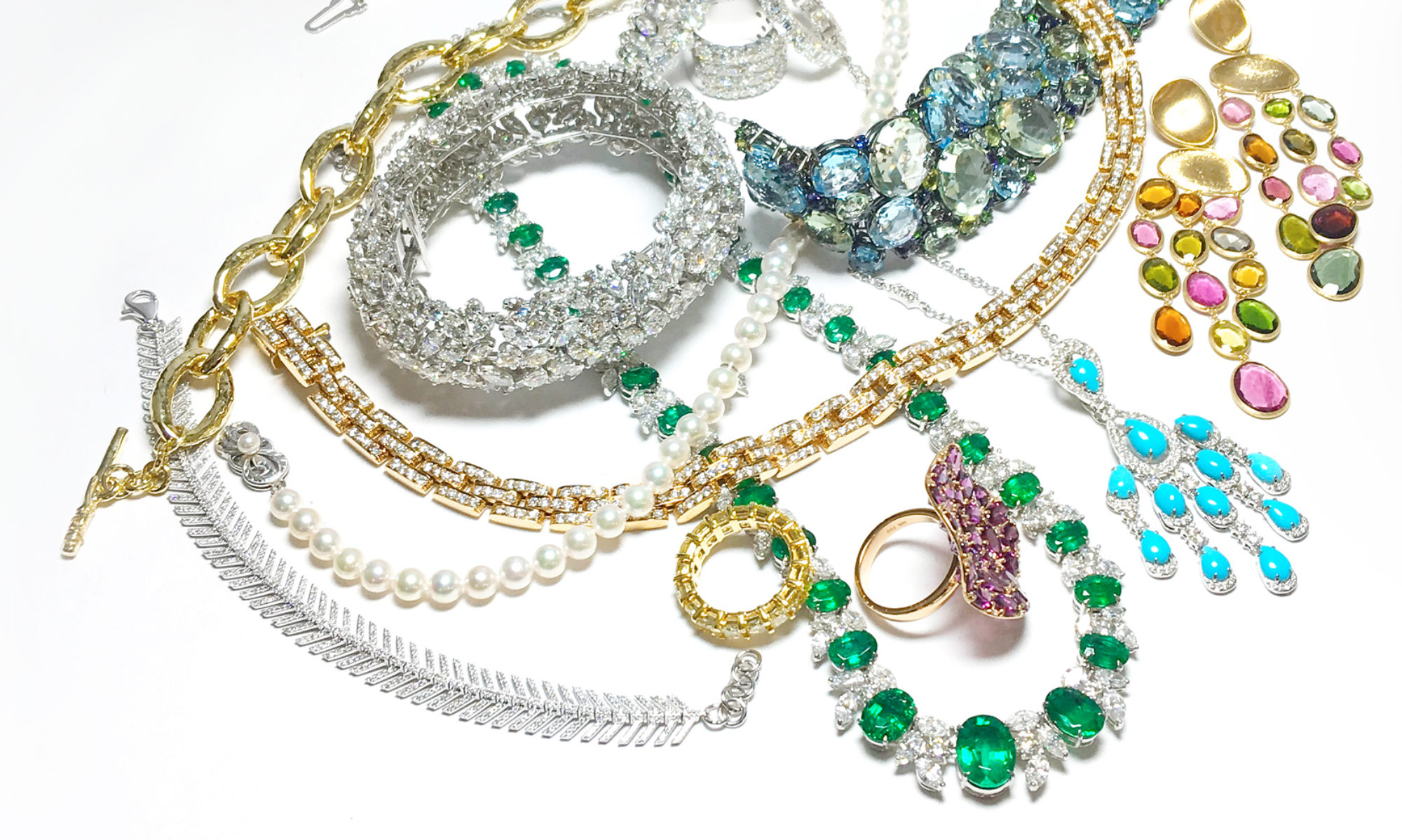I was heavily focused on my Asiago cheese bagel during a Saturday morning sales meeting when it was announced that Ippolita Rostagno would be making a personal appearance at the store.
*Record scratch* Wait, WHAT? The fabulous half-Italian, half-American, Florence-born artist, jewelry designer and all around Renaissance woman would be coming to Zadok? I put my bagel down and tried to calm my inner fan girl. It takes a lot to make me stop eating my bagel during a sales meeting, but this was big news.
Ippolita Rostagno makes some of the most wearable, versatile and comfortable fine fashion jewelry out there. She launched her eponymous line, Ippolita (pronounced eeh-POH-lee-tah), in 1999 when Bergdorf Goodman in New York agreed to place a few pieces in one of their display windows.

She met a need that most designers didn’t know existed: fine jewelry women could wear every day, not just on special occasions. As Rostagno is fond of saying, her pieces are “cool enough to covet, and classic enough to keep.” The rest is history.
I approached her with some trepidation the day of the Ippolita trunk show. I had no idea what she would be like, or if she would want to answer my questions. But I shouldn’t have worried. Rostagno’s preternaturally calm presence and serene, knowing blue eyes immediately put me at ease. Below are excerpts from our conversation.
Jewels Abound: You have several women in senior positions at Ippolita, including your chief commercial officer. How important is it to you to have women filling these senior roles?
Ippolita Rostagno: Well, I would say it’s very important because this is a product that is designed by a woman. It’s for women and meant for women, and women are much more sensitive to every single aspect of the design, manufacture and sale of a product that’s meant for women. At one point I think I maybe had only one singular man in the whole company [laughs], and then we eventually diversified a little bit more just for the company culture. But honestly, it’s better if you have women because women understand every single thing about it because they are the customer.

JA: Next year is the 20th anniversary of your brand. How do you feel about reaching this milestone, and is there anything special in the works? Maybe an anniversary collection?
IR: Yeah, I’m going back to basics. That’s one of the things that these 20 years have taught me. There’s a reason that people responded to your brand in the first place. Your unique vision and your particular point of view is what other people find valuable and communicates something interesting. I’m a big fan of making a product that is relevant, and [as for] the commercial aspect of being in business, it takes a lot of trust for somebody to, you know, plunk down the money, essentially [laughs]. They really have to believe that you have a vision that has staying power. After 20 years I think I can say okay, now it’s clear to me, too.
You know, clearly, at the beginning, you don’t know what your vision is. You don’t know what your aesthetic is. And your aesthetic is 20 years of editing and editing and editing and editing. And peeling off the things that are not really core. Now I have a true understanding of where I exist in the world in terms of an aesthetic, in terms of having built, you know, a craft language. And so for the 20th anniversary, I am looking forward in a sense to sort of re-crafting that message in a core way that everybody — you know, because there are a lot of new adopters who sort of missed the trajectory of the brand.

JA: Myself included! Because when you first started it was just metal, right? And you came to the stones later?
IR: Yes. Yeah, just metal. For the first six years, it was just metal. And it was just gold. Because I come from a sculpture craft background, not a jewelry background. So I needed to learn the job, you know, so I learned on the job. But it was a different time, too. The category of fine fashion jewelry didn’t even exist, you know? In many ways I pioneered this transition and now there is a whole world in this fashion fine jewelry category that didn’t really exist at all before. There have been a lot of changes, but even though there have [been], I think that there are a lot of things that are very core to what I did at the beginning that are valid and evergreen, and in some ways need to be re-narrated.
JA: You come from an artistic background and live what many would consider an unconventional life. Do you have any advice for people who come from a more rigid background and are afraid to take the steps toward the unconventional life that they truly want to live?
IR: You know, I would say that nowadays you don’t even really have a choice, meaning the world is shifting. Everything is shifting [from] the way that you knew it. I mean, this concept that you start in the mail room and end in the boardroom is no longer viable. And so, even the concept of spending your life at a single company doesn’t really exist. Therefore, I think it’s challenging even if you want to follow a traditional path, to figure out what to do.
But my life experience, I think, has taught me that no matter what you pick, it’s difficult. Even if you pick a quote-unquote normal path, be a lawyer, be a whatever, you still have to find your place in the firm, you still have to find your place in the world, you still have to find your place in the niche of what you’re doing, and it’s not easy. So, therefore, you might as well pick something that you are really passionate about because it takes so much work to sustain that interest over the course of a lifetime that you’re better off. You’re better served for your soul to pick something that you enjoy doing because you’re going to be doing it long and hard for a long time [laughs].
So I really think, you know, don’t wait to jump ship. You know, just let me do something quote-unquote easy, like going to work for somebody, if that’s not really what you want to do. Try to get into the field you’re interested in quickly because you’re going to fail repeatedly. But failure is the same thing as learning. You’re going to learn a lot, you know, so that’s my advice. Yeah.
This interview has been edited for length and clarity.

What a great Q&A! I did not know her 20th anniversary was coming up – thank you!
Thanks so much for reading, Betty! Yeah, I can’t wait to see what we get next year for the anniversary. I’m thinking back to basics will mean lots of gold.